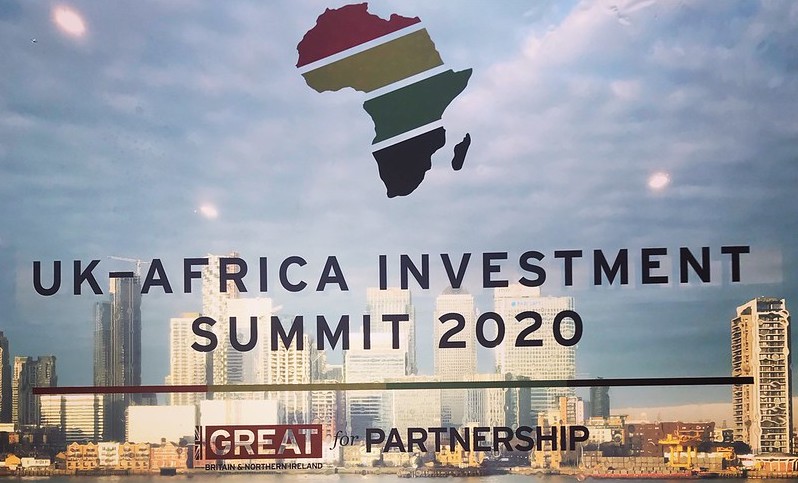By Chloe Farand, Climate Home News
The UK will formally end all direct support for coal mining and power plants abroad but still help African countries “extract and use” oil and gas, prime minister Boris Johnson announced on Monday.
Johnson made the remarks at the opening of the UK-Africa investment summit in London – a one-day event which signalled the UK’s intent to compete for African business with China, Russia, Germany and France – all of which have strengthened their investment strategy on the continent.
16 African leaders attended the summit planned a day before political and business leaders meet in Davos, Switzerland. Egypt’s president Abdel Fattah el-Sisi, Kenya’s Uhuru Kenyatta, Nigeria’s Muhammadu Buhari and Paul Kagame of Rwanda all came to London.
The summit was also an opportunity to push climate action as one of the UK’s key diplomatic priorities, ahead of hosting this year’s UN climate talks – known as Cop26 – in Glasgow in November.
Johnson acknowledged that most African countries were on the frontline of climate impacts and biodiversity loss.
He committed to end “new direct official development assistance” to thermal coal mining and coal power plants overseas, including aid money and loan guarantees and support from the UK’s export credit agency.
“There is no point in the UK reducing the amount of coal we burn if we then trundle over to Africa and line our pockets by encouraging African states to use more of it,” he said.
Instead, Johnson said the UK would help support Africa’s transition to “lower and zero carbon alternatives”.
“First by helping you to extract and use oil and gas in the cleanest, greenest way possible – and we are world leaders in that and have much to share – but also by turbocharging our support for solar, wind and hydro and all the other carbon free sources of energy that surround us,” he told African heads of state and business leaders.
In practice, very little of the UK’s development money has been used to support coal projects overseas in recent years.
Responding to a UK parliamentary inquiry last year, Claire O’Neill, the UK’s former clean growth minister and now Cop26 president, said the UK government’s export finance agency had “not funded any new coal-fired power-plants overseas since 2002”.
A spokeswoman for the Department of International Development (Dfid) said the department had not supported coal-fired power plants abroad since 2012. Support would, however, be made available for decommissioning projects, she added.
Labour MP Matthew Pennycook said this made it “difficult to see this as anything other than tokenistic”.
“The more pertinent issue is the UK’s ongoing support for overseas oil and gas projects. Act on that, Prime Minister,” he tweeted.
“This is greenwash and hypocrisy of the highest order,” Molly Scott Cato, Green MEP for the South West of England, told CHN. “This is a reminder of what has effectively been UK policy for nearly 20 years; hardly an announcement.”
It is unclear what proportion of the UK’s current development and export credit budget will be affected by the announcement. CHN contacted the UK government for comment.
Sarah Wykes, lead analyst on climate change and energy at the Catholic Agency for Overseas Development (Cafod), told CHN that between 2010 and 2017, Cafod identified £84million the UK government had spent on coal equipment – “a tiny proportion” of all spending, she said.
“It’s good that the government has now closed that loophole. It’s a step forward but a drop in the ocean” compared with oil and gas support, she added. “But if the government is serious about ending energy poverty in Africa, it needs to invest in decentralised renewable energy,” she said.
However, the UK government has continued to pour significant amounts of public funds to support oil and gas projects abroad.
During the 2018-2019 financial year alone, the UK’s export finance (UKEF) agency provided more than £2 billion ($2.6 billion) in support and loans guarantees to oil and gas projects overseas, according to an analysis by DeSmog UK.
A recent report by Cafod also found that between 2010 and 2017, 60 percent of the UK’s support for energy in developing countries was fossil fuel energy. During that time, 97 percent of the UK export finance’s support for energy projects – or £3.6 billion ($4.7 billion) – went to fossil fuel developments.
Andrew Norton, director of the International Institute for Environment and Development (IIED), described the announcement as “a first step in the right direction”.
“But it needs to go further,” he added, calling on the UK to “stop subsidising all fossil fuel exploration and production”.
Adam McGibbon, a senior climate campaigner at Global Witness, told CHN, the announcement would make “very little difference to the UK’s lack of climate ambition”.
“It leaves untouched the billions in oil and gas support that the UK will continue to spend worldwide,” he said.
Image: DFID/Russell Watkins, CC-by-2.0
Subscribe to our newsletter
Stay up to date with DeSmog news and alerts






